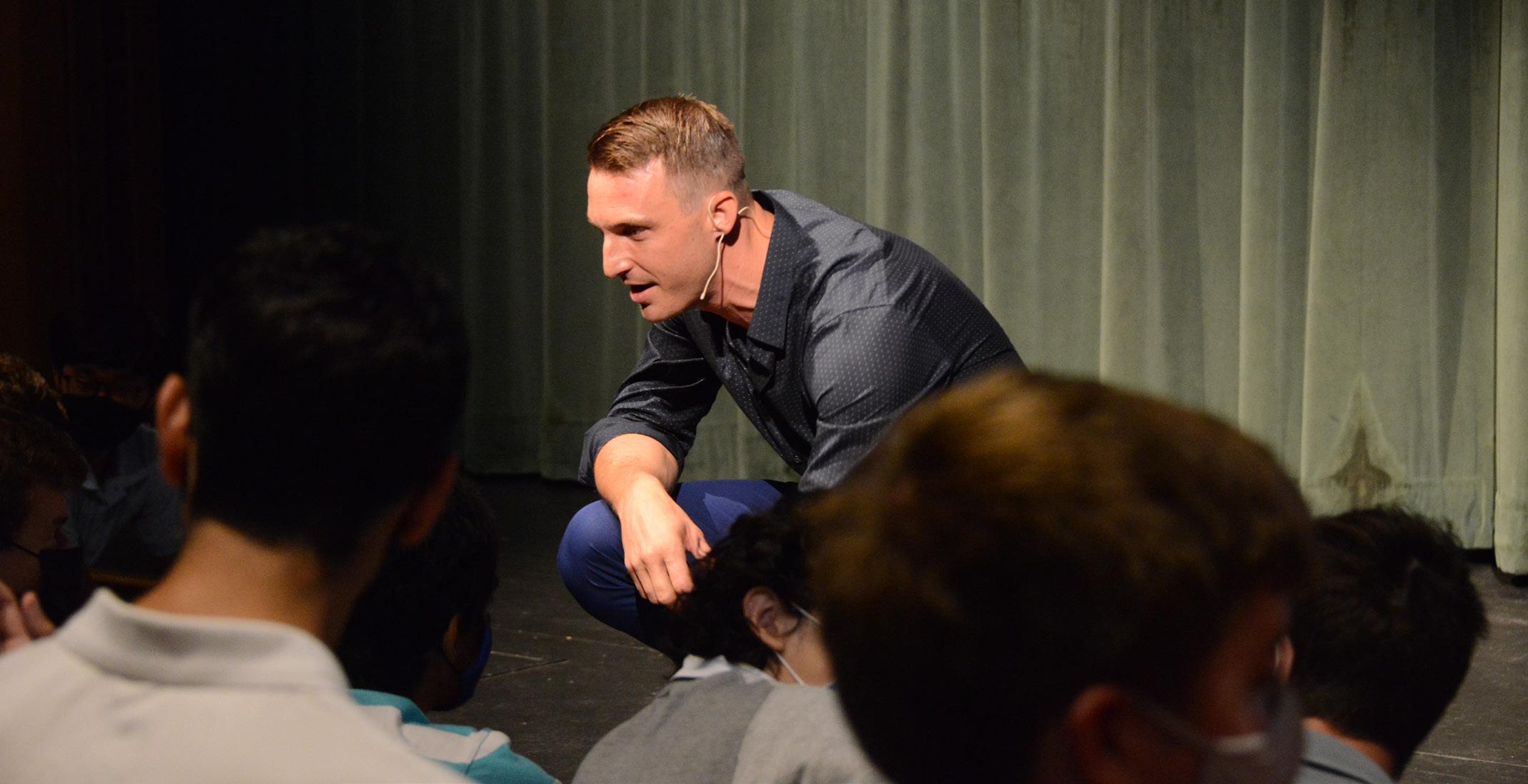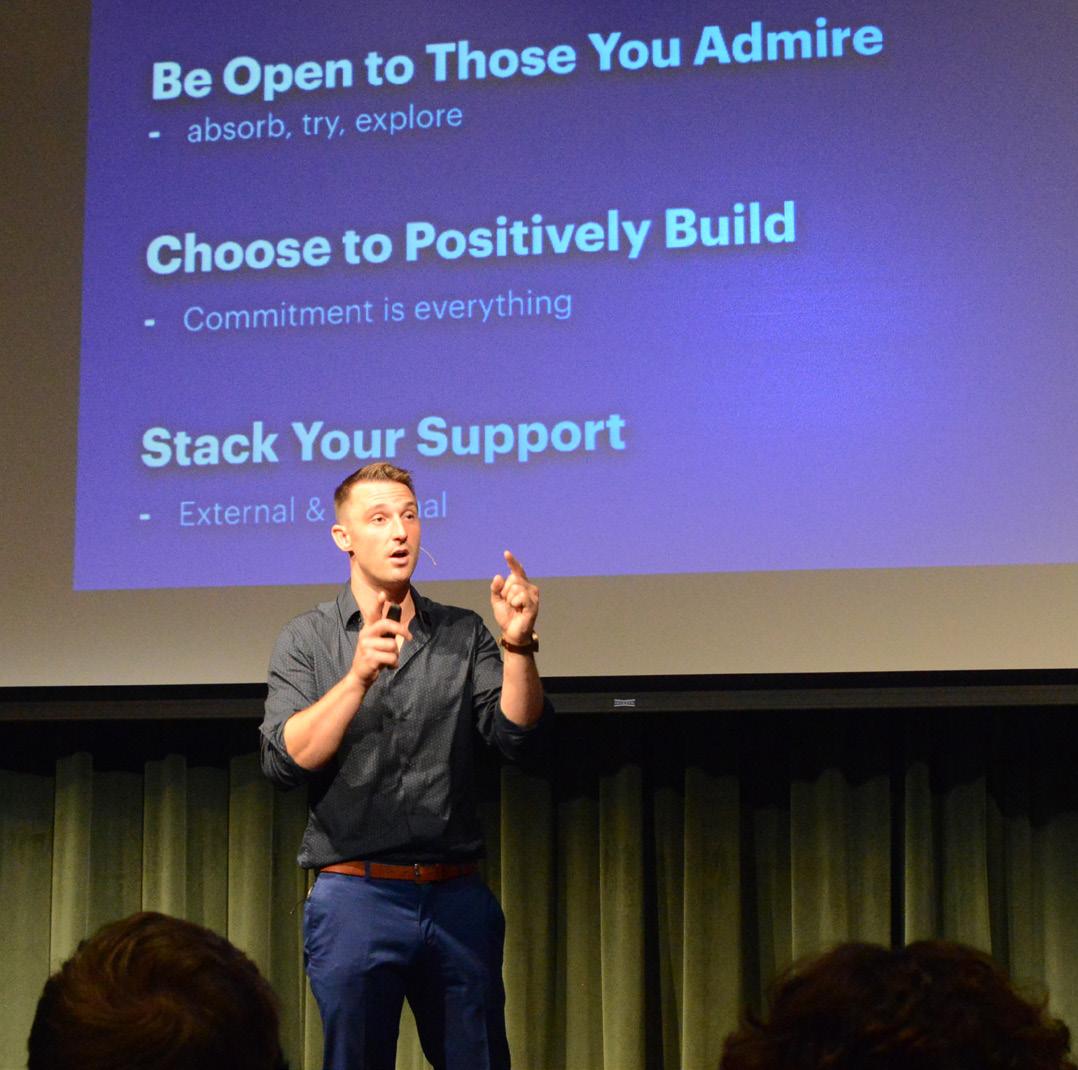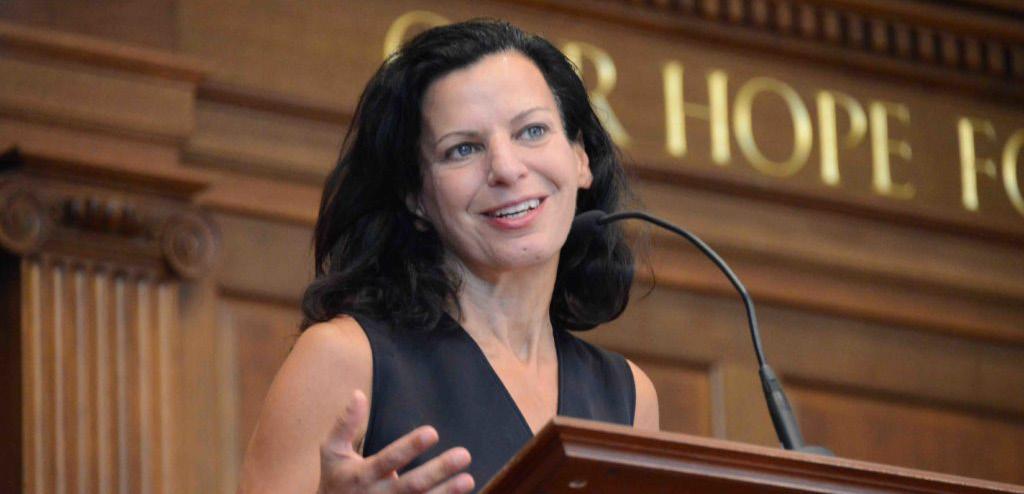
9 minute read
RL News & Hall Highlights
Alex Weber On Choosing A Life of Integrity
“At Roxbury Latin, as you know, we care not only about helping you develop your intellectual passions and pursuits, but also about helping you develop the tools to lead physically, mentally, and emotionally healthy lives,” began Headmaster Brennan in Hall on September 14. “Three years ago we launched a new program aimed at addressing—in formats like this—topics related to health and wellness. We have welcomed speakers on topics related to addiction, mental health, nutrition, social media, gender identity, and healthy sleep. This year we will bring to campus a range of individuals who will focus on various facets of masculinity: what it means, how we experience it, and how it manifests itself within us and in society at large.”
Advertisement
In the Smith Theater, Roxbury Latin welcomed its first speaker in this year-long series, Mr. Alex Weber. Mr. Weber is an internationally known speaker, award-winning entertainer, and an elite American Ninja Warrior athlete. A college lacrosse player at the University of Pennsylvania, Mr. Weber has been awarded the U.S. Lacrosse Coach of the Year distinction, for his role as head varsity coach at HarvardWestlake School in Los Angeles. He also competed in the lacrosse World Championships, finishing as a top scorer. “Despite these accomplishments,” said Mr. Brennan, “Mr. Weber knows what it feels like to experience setbacks, selfdoubt, pressures, uncertainty, and failure. And he now knows what it takes to overcome them.”
Bringing great energy to the room, Mr. Weber began by pointing out the difference between have to—“I have to do my homework,” or “I have to run sprints at practice”—and get to. “It is a great privilege for you to attend this remarkable school, so remember this: You don’t have to do anything. You don’t have to finish that project, or head out to the practice field at the end of a long day. The choice is all yours. However, if your goals are to get into that college, or to beat that rival team, then these are decisions you get to make. What are you going to put into life to reach your goals? No one can decide that for you.”
Who do you want to be? was the essential question that Mr. Weber posed. “Who are some men you admire? Dwayne Johnson? Abraham Lincoln? Will Smith? Your grandfather? Your teacher? Your coach? What do you admire about them? There are no rules for what it means to be a man—there are only suggestions, maybe some best practices. You get to choose and be anything you want. Study what you like about

men you admire, what you respect, and then try it out. Acquire from those you admire.”
Mr. Weber—through personal stories of triumph and tribulation, struggle and success—underscored that we all are the product of what we do most often; none of us are perfect, and at times we will choose something we regret, but what we choose to do most often will be who we are, and how we are known. He suggested that boys adopt the three-step strategy of Define, Decide, Do. He urged boys to build, rather than bail. “Remember that this life has no rules. It’s a choose your own adventure. I urge you to be open, choose positively, and surround yourself each day with people, choices, and habits that are ‘floats,’ which build you up, rather than ‘anchors,’ which weigh you down.”
“If you give the game the best you have—and remember, the game is whatever you choose it to be—then the best will come back to you. We are at our best when other people need us. Be there for one another, be floats for the people in your lives, and choose to surround yourself with floats, as well.”
One student shared directly with Mr. Weber after his presentation: “I just wanted to thank you for the great words you said in the Hall this morning. It made me think more about how everything really is in my hands, about how hard I want to work to succeed in my dreams. I appreciate it, and I hope you come back to RL soon.” //

Juliette Kayyem on 9/11 Anniversary, and Threats to the U.S. Today
“Earlier this month, across the United States, citizens paused to commemorate the twentieth anniversary of the events of September 11, 2001, commonly known as 9/11,” Headmaster Brennan began in Hall on September 21. “Regardless of one’s personal connection to the attacks of that day, all of us were affected by them, and all of us continue to be affected by the concerns about security and terrorism that have resulted from it… Twenty years ago we would probably not have known of someone identified as an expert on homeland security and terrorism. But today we have the pleasure of welcoming to RL one of the foremost thinkers on these issues, Juliette Kayyem.”
Ms. Kayyem is the Robert and Renee Belfer Senior Lecturer in Public Policy at Harvard’s Kennedy School of Government, where she is faculty director of the Homeland Security Project and the Security and Global Health Project. She served as President Obama’s Assistant Secretary for Intergovernmental Affairs at the Department of Homeland Security—a department created in the wake of 9/11—and has been a national leader in America’s homeland security and emergency management for nearly 25 years.
Ms. Kayyem began her Hall talk by defining terrorism as violence, or the threat of violence, used against civilians for political purpose. “This is the definition we operate with,” Ms. Kayyem said. “I will acknowledge that one person’s terrorist is another person’s freedom fighter. That’s a debate you can have in your classes.”
She continued by offering a concise master class on the evolution of terrorist threats in America over 20 years, chronicling the events and inventions that have caused people in her area of work to shift focus as the terrain of threats changes.
“It used to be the case that terrorists wanted a lot of people watching, but not a lot of people dead, because killing a lot of people makes others less sympathetic to your cause,” Ms. Kayyem began. She explained how terrorism out of the Middle East began to rise in the mid-90s, though the political motives were vague. “In 1995, there was a real ratcheting up of terrorist violence, specifically with the first World Trade Center bombing. With the rise of Bin Laden and Al Qaeda—who began specifically targeting American civilians—the terrorist agenda had changed: they wanted lots of people dead and lots of people watching.”
Ms. Kayyem explained how in 2004, when Facebook was founded, the dynamics of how we communicated changed. Terrorist groups began to capitalize on the ability to use social media’s reach to radicalize people. “Around that same time, in
2005, there was a significant shift in U.S. security efforts; that’s when Hurricane Katrina hit the Gulf Coast. We realized that we had to expand our focus beyond counterterrorism efforts— on keeping guys off planes—to all hazards and threats. When Katrina hit, we weren’t able to protect an American city from this environmental crisis.” Threats that she and her colleagues began to focus on at that time persist today: climate change and climate disaster, but also pandemics and cyber-terrorism.
“In 2008, when President Obama was elected, we saw a rise in white supremacy and domestic terrorism in America,” Ms. Kayyem continued. “By 2016, this domestic terrorism was a more present threat than the Middle East or Al Qaeda. From 2008 through 2016, we saw more of what we call ‘lone wolf’ attacks, like that at Pulse Nightclub, which are more distributed and less existential. ‘Lone wolf’ is a misnomer, actually, since these individual terrorists were actually together online, where groups like ISIS were enlisting social media with intent to lure and radicalize individuals around the world.” “In 2016, when Donald Trump was elected and perpetuated a narrative of America first—us versus them, pointing to Mexican immigrants, instituting a ban on Muslims entering the U.S.—another key factor came into existence: The year 2016 was the first time in American history when the birth of non-caucasian babies outnumbered the birth of caucasian babies. This ‘great replacement,’ as it’s referred to, marks a resurgence in the white supremacy movement, perpetuated by social media.”
Ms. Kayyem described how this domestic terror threat, as well as threats posed by climate crises and the COVID-19 pandemic, are in her opinion the most pressing threats in the United States today. Homeland security professionals and counter-terrorist efforts also have a keen focus on what they call “over the horizon” threats, posed by technology and cyber-terrorism.
“Remember,” she concluded, “people are certainly allowed to have any political beliefs and opinions they wish—that’s not what we’re talking about here. We’re talking about combining these political beliefs with violence—use of violence, threat of violence. That’s terrorism, whether it’s coming from outside of the U.S. or from within.”
During the Q&A session that followed, one student asked: What is the most important thing we can do to keep our country safe? Ms. Kayyem’s response was that we are safer, as a country, when we help people coming to the U.S. from outside our country buy into the American experience, buy into being American, buy into being proud of living in America and the best of what we represent as a country.
Prior to her work in the Obama administration, Ms. Kayyem was Massachusetts Governor Deval Patrick’s homeland security advisor. She has served as a member of the National Commission on Terrorism; a legal advisor to U.S. Attorney General Janet Reno; and a trial attorney and counselor in the Civil Rights Division at the Justice Department. Ms. Kayyem is also the CEO and co-founder of Grip Mobility, a technology company looking to provide transparency in the rideshare industry. She is an award-winning author, journalist and commentator, and is featured regularly as a national security analyst on CNN and WGBH, Boston’s Local NPR station. //










